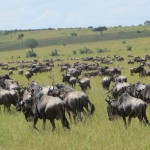 As the new teaching semester has started and business, and consequently stress, ensues. I reflect back on lessons learned from the African Savannah, applicable for both me and my students. Sitting in the safari truck on the Maasi Reserve, I watched as two male lions awoke from slumber and made their way to a watering hole through a herd of impala and wildebeests. Aware of the immediate danger and terrified, the impala and wildebeests scattered quickly running from these two magnificent beasts. They did not stop until the danger passed. However, once the lions were a safe distance away, the herd settled back into grazing. Something, apparently innate in the impala and wildebeests, sounded an alarm when the danger of the lions was noticed, but it seemed to switch off immediately once the danger passed. These animals went immediately back to grazing.
As the new teaching semester has started and business, and consequently stress, ensues. I reflect back on lessons learned from the African Savannah, applicable for both me and my students. Sitting in the safari truck on the Maasi Reserve, I watched as two male lions awoke from slumber and made their way to a watering hole through a herd of impala and wildebeests. Aware of the immediate danger and terrified, the impala and wildebeests scattered quickly running from these two magnificent beasts. They did not stop until the danger passed. However, once the lions were a safe distance away, the herd settled back into grazing. Something, apparently innate in the impala and wildebeests, sounded an alarm when the danger of the lions was noticed, but it seemed to switch off immediately once the danger passed. These animals went immediately back to grazing.
This is unlike what is becomes innate or automatic to us as humans. When threats, intangible or real, are present, anxiety, stress, and irritability ensue. These feelings are often prolonged and confounded because once the mind senses “danger,” it takes a stroll though memories searching for a reason “why” and the “what ifs…?” Why I so tired and stressed? What’s wrong with me? How am I going to get rid of this stress? What if…?
According to experts on mindfulness such as Mark Williams, Danny Penman, Jon Kabat-Zinn, when the brain alarm signals are triggered by a situation, we, as humans, stay turned on because we bring to mind the past threats and future worries. The bodies fight/ flight/ immobility response does not switch off, unlike that of the impala and wildebeests, once the danger has passed. We often enter a spiral of negative thoughts and emotions.
In fact, I witnessed this in class this past week. Students who lose a few points on an assignment begin to panic. Thought of, “What if I lose too many points and fail,” “How am I ever going to make it through this research class?” and “Last time I took statistics I almost failed.” result in more panic and feelings of distress.
Therefore, what is the lesson we can learn from the impala and wildebeests. Well according to mindfulness experts, we need to learn to tune into feelings in the moment- be mindful of them, feel them, and then, like the animals on the African Safari, let them go as they will dissipate if we do not enter into the spiral of thoughts and emotions. This is; however, easier said than done as I once heard Mark Williams say, we habituate constantly “doing,” so we forget how to “be.”
Thus, it is important, especially in the midst of business, to take time to stop- to practice mindfulness and mediation. That is, begin to train ourselves to pay attention in the moment as things are so that when “dangers” arise our initial response, assuming there is no immediate danger and the need to fight or flight, is to be aware of feelings and sensations in the present in a manner in which we can discern what is true.
Therefore, instead of panic, a student who loses a few points on an assignment recognizes feelings of frustration and disappointment, acknowledges them, and makes a true assessment of the situation, i.e., “Even if I lose 5 points on every assignment, I can still pass the class. I don’t like losing points as it makes me feel disappointed. I feel heaviness in my chest. Nevertheless, it does not mean that I will fail the class. Thought of, “What if I lose too many points and fail.”
Therefore, in order to have a more anxiety and stress free semester, we may need to think about becoming habitual in being reflective aware of experiences through the daily practice of mindfulness and s mediation. We like the he impala and wildebeests, can “switch off” after the “dangers” have passed.

